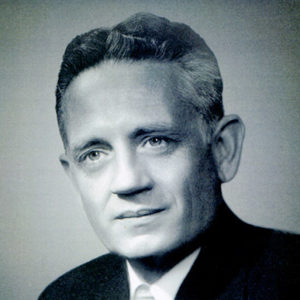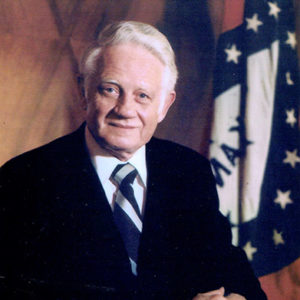calsfoundation@cals.org
Paul Wolfe (1908–1976)
Paul Wolfe was a lawyer and World War II veteran who later became the circuit judge for the Twelfth Judicial District of Arkansas (Scott and Sebastian counties) and was appointed by the U.S. Supreme Court to organize and chair a committee to write what became the textbook for the new National Council of State Trial Judges under the administration of the American Bar Association. He also served as a member of the Arkansas Model Criminal Jury Instructions Committee.
Paul Wolfe was born on January 5, 1908, in Weir, Kansas, to John Walter Wolfe and Myra Este Vasser Wolfe. His first name was Harry, but he preferred to use his middle name, Paul. The Wolfe family moved to Fort Smith (Sebastian County) sometime before 1911.
Wolfe joined the National Guard at age sixteen while in high school and continued his military service until 1928, when he began law school at the University of Arkansas (UA) in Fayetteville (Washington County). After only two years of law school, he passed the bar and became licensed as an attorney. He returned to the university to complete his third year, graduating in 1933.
Wolfe married Jean Johnson on January 12, 1932, in Memphis, Tennessee. The couple returned to Fort Smith, where Wolfe joined the Hardin Law firm. They had three children. Wolfe entered the U.S. Army in 1938 as a captain in the Judge Advocate General (JAG) Reserves. In 1939, Wolfe was elected prosecuting attorney for the Twelfth Judicial District and was reelected for a second term in 1940. He resigned in 1941 to transfer to Washington DC as a major in the U.S. Judge Advocate General Office, under active service during World War II.
In August 1942, Wolfe accepted a promotion to lieutenant colonel division judge advocate general for the Third Armored Division. As the division JAG, he was responsible for the initiation and supervision of courts martial, including recommendation to the commanding general as to the final adjudication of charges. Wolfe’s duties as the division JAG came to include advising the commanding general on relationships with Allied civilians, participating in drills and exercises, and providing legal counseling for the 16,000 soldiers of the division.
Wolfe worked for a commanding general who liked to be at the front lines. In September 1943, Wolfe and the Third Armored Division departed for England. They continued training in England until landing at Omaha Beach in Normandy in July 1944. In France, the Third Armored spearheaded the Allied forces through northern France and Belgium, crossing the Rhine River into Germany. Wolfe and the Third Armored captured Cologne on March 7, 1945, and liberated the Nordhausen concentration camp on April 11. During the war, Wolfe’s right hand was injured by an exploding mine, and shrapnel later damaged his back. He was twice awarded the Purple Heart. In recognition of his exemplary work as a division JAG, he was also awarded a Bronze Star.
The Third Armored ended the war in Darmstadt, Germany, where the division JAG gained additional staff to process courts martial. Instead of being discharged, Wolfe was reassigned to Camp Chaffee (now Fort Chaffee) in Arkansas.
Wolfe and his first wife divorced in 1945. Upon his return home, he married a woman named Jim Henderson. Wolfe’s second marriage would also end in divorce, but the couple had a son. Wolfe married a final time, to Ruth Flanagan Gramlich, in late 1959.
Wolfe, now on reserve status, worked in the U.S. District Attorney’s Office in Fort Smith as an assistant U.S. district attorney until 1948. He was re-called to active duty for the Korean War and was stationed at Fort Bragg, North Carolina, and Munich, Germany, where he was chief of the Military Justice Branch. In 1952, he transferred to reserve status and was promoted to colonel. He returned to Fort Smith, remaining on reserve status until retiring in 1957.
Upon his return to Arkansas, he again served as an assistant U.S. district attorney until 1954, when he ran successfully for circuit judge. He held the position from 1955 to his retirement in 1975.
During his tenure, he was appointed by the U.S. Supreme Court to organize and chair a committee to write the National State Trial Judges book, which became the textbook for the new National Council of State Trial Judges. He also organized and chaired a committee to write the Model Civil Jury Instructions. He then became a member of the Model Civil Jury Instructions Committee that edited later updates of the instructions; he also served as a member of the committee to write the Model Criminal Jury Instructions. He was later given the Award of Merit by the American Trial Lawyers Association for this work. Upon his retirement from the bench in 1975, he was appointed as a consultant for the Speedy Trial Act, which was approved by the U.S. Congress earlier that year.
Wolfe was active in Fort Smith community activities. He organized and chaired a community effort to restore the site of the former Judge Isaac Parker’s court, including the enlargement of the court and gallows; the site later became a national park. He also organized the community’s role in the Bicentennial Celebration of the Butterfield’s Overland Mail Company. He served as an umpire for Little League baseball games and volunteered for the new telephone hotline operated by the local Sparks Medical Center.
Wolfe died on October 26, 1976, from cancer.
For additional information:
Arkansas Practice Series: Arkansas Model Jury Instructions. 2015 ed. New York: Thomson Reuters, 2015.
Paul Wolfe Papers, Center for Arkansas History and Culture. University of Arkansas at Little Rock, Little Rock, Arkansas.
“Paul Wolfe to Seek Re-Election as Prosecutor.” Fort Smith Southwest American, April 28, 1940.
Wolfe, Paul. “Rules for the Twelfth Judicial Circuit of Arkansas.” St. Paul, MN: West Publishing Co, 1965.
John Jones
Center for Arkansas History and Culture
 Law
Law Military
Military World War II through the Faubus Era, 1941 through 1967
World War II through the Faubus Era, 1941 through 1967 Paul Wolfe
Paul Wolfe  Paul Wolfe
Paul Wolfe 




Comments
No comments on this entry yet.